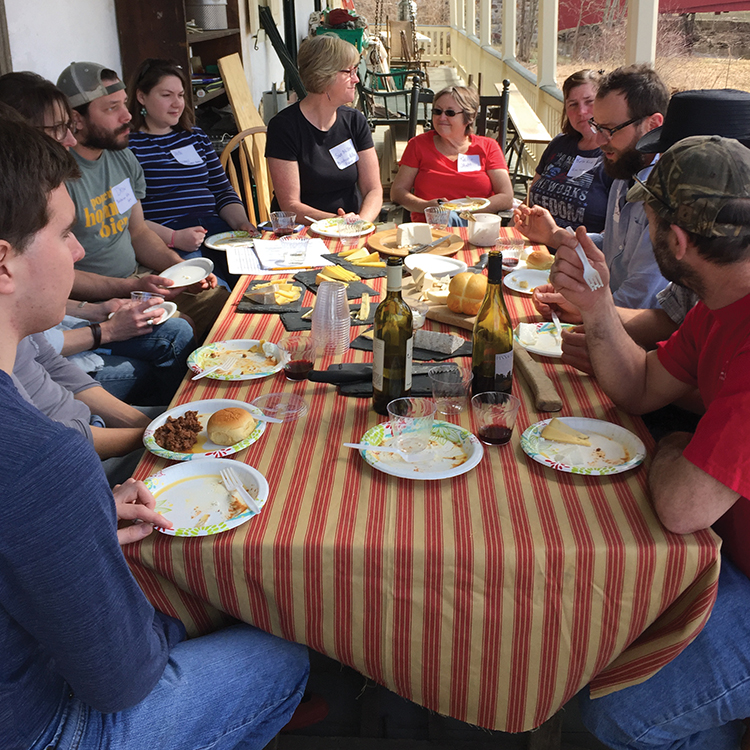Photo compliments of Philadelphia Cheese Guild
Education and advocacy are key for a growing industry with changing regulations
by Alex Jones
On a cold day between snowstorms in January 2016, cheesemakers and dairy advocates gathered in a Penn State agriculture sciences classroom. The small meeting—catered with leftover wheels from the Pennsylvania Farm Show’s cheese competition—marked the moment the defunct Pennsylvania Farmstead and Artisan Cheese Alliance was reborn as the Pennsylvania Cheese Guild.
Flash forward 14 months to the 2017 annual membership meeting in March, and you wouldn’t know it was the same group.
More than 40 cheesemakers, associates and enthusiasts crowded into a private room for the meeting at Harrisburg’s Millworks brewery. Over a pulled pork buffet lunch, they voted on board members and discussed recent changes in enforcement of state and federal regulations governing cheesemaking. The group listened intently as the day’s keynote speaker, Oldways Cheese Coalition Program Director Carlos Yescas, shared encouraging statistics about U.S. consumers’ raw-milk cheese consumption; at the end of the meeting, he met individually with several cheesemakers to evaluate choice wheels from their aging caves.
The guild now boasts at least two dozen cheesemakers as members, including two in New Jersey and Virginia, as well as several associate members from food industry businesses such as dairy equipment companies and specialty grocers. A handful of dedicated cheese consumers hold “enthusiast” memberships.
Once the steering committee—that initial group of five cheesemakers meeting at Penn State—reached out to their colleagues about joining the Pennsylvania Cheese Guild, word spread and momentum grew.
“Cheesemakers are always looking for ways to learn more about cheesemaking,” said Donna Levitsky, executive director of the guild and former operations manager at goat dairy Shellbark Hollow Farm.
The organization has rallied its members to have a greater presence at beer, wine and food festivals—such as Philly Bierfest, the PA Cider Festival, and the Philly Farm & Food Fest—to draw attention to this vital segment of the state’s dairy industry, which is the seventh largest cheese producer in the nation.
The number of permitted cheesemakers in the state is around 150; Levitsky estimates that about 85 percent of those are small or farmstead businesses. “y goal this year is to have half of Pennsylvania cheesemakers become members,” she said.
Education is one of the core tenets of the guild’s mission to elevate and promote cheesemaking in Pennsylvania. The guild has organized creamery tours so that cheesemakers can learn from each other, and it has provided courses on making challenging styles of cheese taught by experts in the field.
And there’s strength in numbers: The more cheesemakers and dairies join up with the Pennsylvania Cheese Guild, the easier marketing success, education gains and harmony with regulators will be for the cheesemakers.
The guild’s members have received training in anticipation of changing food safety regulations, a topic always on a cheesemaker’s mind, but doubly so as the Food Safety Modernization Act (FSMA) has taken effect and safe, traditional cheesemaking techniques—such as aging wheels on wooden boards—have come under attack by some regulators.
David Rice, a board member and owner of Clover Creek Cheese Cellar near Altoona, focuses on regulatory issues in his role in the organization.
Companies making and selling raw milk products, including cheeses, must follow strict regulations and engage in frequent, regular testing and inspections with the Pennsylvania Department of Agriculture and local health departments. But lately, changes to what FDA and PDA are asking cheesemakers to do—and how those rules are enforced—have left these small-business owners worried about their traditions, their craft and their livelihoods.
For example, the FDA’s FSMA rules require cheesemakers to write a food safety plan to be compliant—something that cheesemakers are willing and able to do—but the specifics of what FSMA requires remain fuzzy.
“We have a written plan but still haven’t been told by FDA exactly what we should have included in that plan,” Rice said. “We have also found PDA is now enforcing rules that they never mentioned, and they are changing their interpretation of which rules apply to whom.”
In these cases, the guild provides cheesemakers—who want to be compliant with regulations and manufacture and sell their products safely and legally—with a space to share frustrations, brainstorm solutions and present a unified message to state and federal regulators.
Rice said that this year, “My goal [is] for the guild to keep the PDA and FDA aware of what is happening in the industry so they can enforce reasonable and rational regulations that promote effective food safety practices.”



